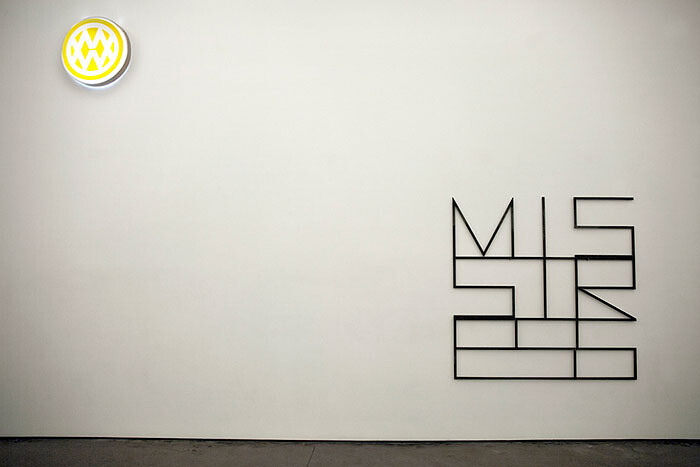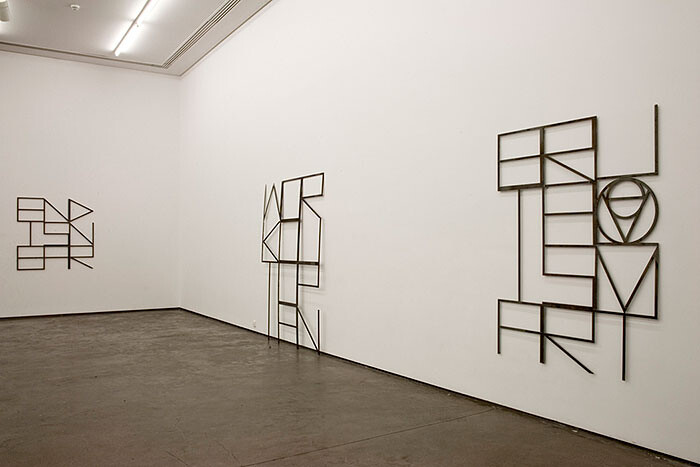The use of the written word in contemporary artworks is nothing new. The structure of text, meaning, semiology, as well as language’s effectiveness as a tool of communication have been explored for many years, by many extraordinary artists and in many ways. Kosuth, Weiner, Darboven, Rosen, you name it. Yet, calling attention to the power of “language” and challenging audiences to rethink this mode of expression—even for the most unimportant and daily needs—never ceases to provide a spectrum of updated interpretations.
The interplay between visual and verbal communication appears in its more naked form in Dirk Bell’s “Grid(love)r” at Andreas Melas and Helena Papadopoulos’s gallery in Athens. Unlike the loose “exuberance” found in some of Bell’s previous works, the mood here is one of demystification of the creative act and explosive artistic expression in favor of a direct engagement with language as an instrument of power. The artist here reveals new modes of truths, reveals meaning and apprehension by inventing slogans, which take the form of wall sculptures, language made two-dimensional in order to better exhibit it. Either hanging or leaning against the gallery walls, WORKOUTOPIAN, BURNOUTOPIAN, ENDISNEAR, BRUTALISMART are the first “truths” with which we are confronted. The font in which all of these are “written” has been conceived by Bell himself and he re-introduces a symbol—a substitute for the letter A—which has recurred in various work the artist has produced over the last two years. The beginning of the alphabet, the letter A becomes here a logotype for love. Bell’s A—that is, a letter that otherwise signifies “first class,” top quality or the best grade you can get in school—has been contaminated. Or rather its top-dog character has been softened by the notion of love. Sturdiness and fragility, imprisonment and freedom, austerity and levity are some of the dualisms evoked by the sculptural objects in the room, hinting at the systems that rule everyday conditions of living.
The lighting is harsh, and there is nothing else in the gallery but these abstract word sculptures, these laser-cut metal grids. They look, well… urgent. After standing there for a while, we begin to realize that the only way out is a “magic” symbol that creates a sort of cacophony in the clarity of these dictating slogans. Love, or so it seems, puts a crack in this well-thought-out system of control, and perhaps this is what one has come to expect from Bell, the artist who dreams up a utopia where love might be the radical element that introduces the potential for a better world. Certainly, it’s a very 60s thought, and very much in tune with the hippie character of his previous works, but the atmosphere here is corporate. There’s a lightbox hung high on the wall, a variation of the VW titled New Men—the romantically idealized state of manhood. (Perhaps Bell himself is the new man. Or maybe his collaborators whose presentations here I won’t mention.) In any case, it’s the trademark of his dreamlike utopia.
The exhibition works almost like a direct commentary on what is happening when you step your foot outside the gallery. The increase of the number of homeless, drug-addicts, and the level of street criminality in the historical center of Athens signals the oppression of power, the failure of the system, the abandonment of the social state. Moreover, in a city where oppressed civilians use every inch of the streets walls to express their own ideas—which by now have become a certain kind of trademark for the daily resistance to unrealistic solutions and the prevailing hopelessness—Bell’s newly coined phrases become even more accurate.






